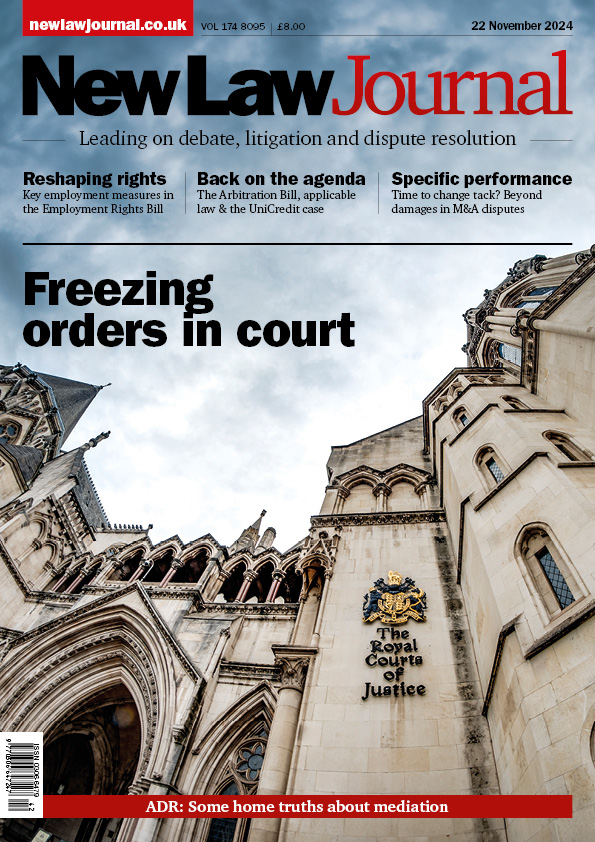THIS ISSUE

John O’Hare states some home truths about mediation
Mark Pawlowski provides a run-down of films featuring thorny legal issues.
The Supreme Court has clarified the role of ‘bad faith’ in invalidating trademarks, in a dispute between a broadcaster and IT company over the word ‘Sky’.
Solicitors could lose their right to handle client money, following the Axiom Ince debacle.
A costs judge has reduced a bill claimed at nearly £260,000 to zero, in a ruling that highlights a gap in legal regulation.
Duty solicitors at police stations will receive an extra £18.5m from 6 December, while legal aid lawyers at youth courts will get a £5.1m boost for the most serious cases, the Lord Chancellor Shabana Mahmood has confirmed.
The Civil Justice Council (CJC) has set out detailed guidelines on evaluating and managing mental capacity—an area of procedure that was previously unclear.
A case management portal and two websites will be launched by the Supreme Court and Judicial Committee of the Privy Council next month, to streamline permission to appeal applications and make ‘interactions with the court as effortless as possible’.
The Legal Services Board (LSB) is consulting on draft guidance for regulators on their duty to ‘promote the prevention and detection of economic crime’.
MOVERS & SHAKERS

Freeths—Ruth Clare
National real estate team bolstered by partner hire in Manchester

Farrer & Co—Claire Gordon
Partner appointed head of family team

mfg Solicitors—Neil Harrison
Firm strengthens agriculture and rural affairs team with partner return
NEWS
Conveyancing lawyers have enjoyed a rapid win after campaigning against UK Finance’s decision to charge for access to the Mortgage Lenders’ Handbook
The Crown Prosecution Service (CPS) has launched a recruitment drive for talented early career and more senior barristers and solicitors
Regulators differed in the clarity and consistency of their post-Mazur advice and guidance, according to an interim report by the Legal Services Board (LSB)
The Solicitors Act 1974 may still underpin legal regulation, but its age is increasingly showing. Writing in NLJ this week, Victoria Morrison-Hughes of the Association of Costs Lawyers argues that the Act is ‘out of step with modern consumer law’ and actively deters fairness
A Competition Appeal Tribunal (CAT) ruling has reopened debate on the availability of ‘user damages’ in competition claims. Writing in NLJ this week, Edward Nyman of Hausfeld explains how the CAT allowed Dr Liza Lovdahl Gormsen’s alternative damages case against Meta to proceed, rejecting arguments that such damages are barred in competition law









